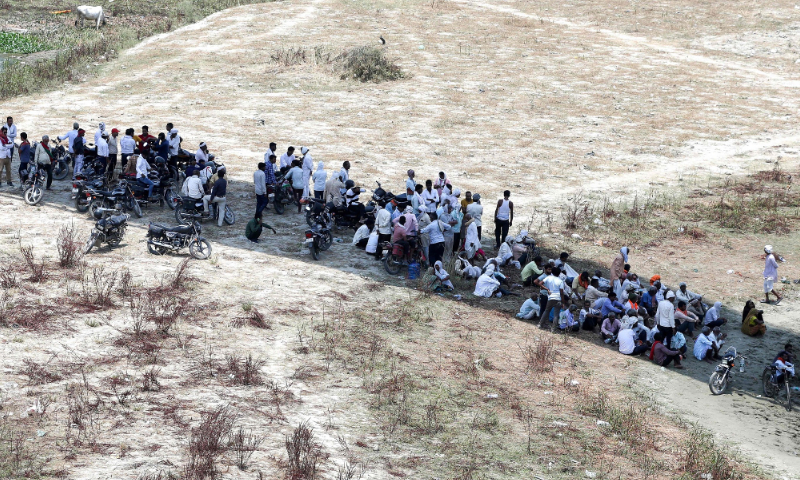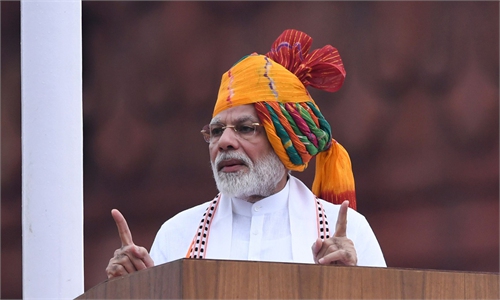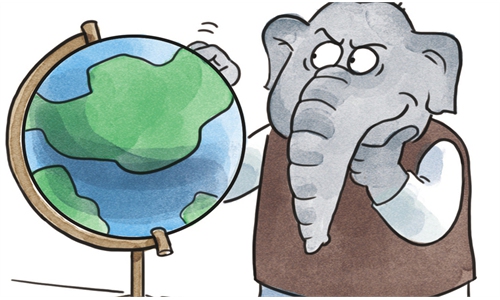
People take rest under the shade of a bridge to shelter from the scorching sun on a hot summer day along the banks of river Ganges in Prayagraj, India on June 3, 2024. Photo: VCG
The recent heat wave that resulted in a rising death toll in India has sparked debate in China on how to deal with extreme weather, with analysts highlighting the crucial role of international cooperation in addressing climate change.
According to Hindustan Times, at least 85 people died of suspected heat stress and related issues in Odisha, Bihar, Jharkhand, Rajasthan and Uttar Pradesh in a span of 24 hours, senior officials in these regions said on Friday, amid an unforgiving heat spell that has pushed temperatures to unprecedented levels in many of these regions.
Part of capital Delhi recorded the country's highest ever temperature at 52.9 C on Wednesday, though the Indian government said on Saturday that the temperature was too high by 3 C due to a weather sensor error, Reuters reported.
The heat wave also hit the country's marathon general election, which concluded on Saturday, with local health and government officials saying that at least 43 election workers have died from heat stroke, heat exhaustion, dehydration and other heat-related illnesses since May 24, according to CNN.
The extreme weather has had an impact on people's daily life. A Chinese national surnamed Wang who works in New Delhi told the Global Times on Monday that the local temperature has soared above 40 C. "People find it extremely uncomfortable to go outside, as they experience a scorching sensation on their bodies," Wang said.
Some Chinese nationals in India have also shared videos on social media platforms, detailing how the extreme temperatures have led to their phones overheating to the extent that they were unable to charge them. Some even resorted to placing ice cubes under their phones to cool them down to ensure timely charging, the Global Times learnt.
The Chinese Embassy in India issued a reminder on Thursday to Chinese nationals to be alert to the ongoing high temperatures. They are being advised to take precautions when engaging in outdoor activities, and to seek medical attention promptly if feeling unwell.
The recent extreme weather in India has triggered debate among Chinese netizens. Shocked by the increasing death toll, some are emphasizing the importance of staying vigilant against the challenges posed by these unpredictable weather patterns, while others are calling for immediate action to address the impacts of climate change.
Zhang Juan, a meteorologist from the Weather China website, noted that India usually experiences a monsoon season from June to September every year. Before the monsoon arrives, the sun's direct rays move northward, leading to increased solar radiation. At the same time, the subtropical high pressure system strengthens, resulting in extremely hot weather during this period.
The combined effects of global warming and the El Niño phenomenon have also exacerbated the current extreme high temperature conditions, climate experts noted, adding that the abnormal warmth in the Indian Ocean region makes the situation even more complex.
To address such extreme weather, experts highlighted the importance of countries working together to face challenges of common concern. "The potential for China and India to advance cooperation in the field of climate change in the future is enormous," Long Xingchun, a professor at the School of International Relations at Sichuan International Studies University, told the Global Times on Monday.
In light of the climate change, which poses challenges to the entire world, India should approach cooperation with China with a more open mindset, analysts said, noting that collaboration between these two countries could yield mutually beneficial outcomes.
In 2022, the China Center for South Asian Studies at Sichuan University issued a report on position, policy and cooperation between China and India regarding climate change. The report, a collaborative effort by experts and scholars from both countries, proposed potential avenues for China and India to enhance their collaboration in addressing the common challenges of climate change, which aims to help guide public opinion in the two countries to view the prospects of China-India cooperation objectively and rationally.



